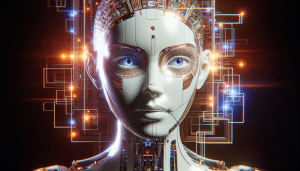Should You Rely on Mental Storage Alone?
Oliver Cooper July 30, 2025
In today’s fast-paced work environment, our mental capacity is often stretched to its limits. We’re expected to remember vast amounts of information, handle complex tasks, and make quick decisions—all while staying connected to an overwhelming number of digital platforms and tools. But the question arises: Should we continue relying on mental storage alone, or is it time to embrace the technological advancements that could offload some of this mental burden?
As artificial intelligence (AI) and cutting-edge technology continue to evolve, the future of work is being reshaped in profound ways. Mental storage, the capacity of our brain to retain and process information, has its limits. While it’s undeniably a powerful tool, it may no longer be sufficient for the increasing demands of the modern workforce. In this article, we’ll explore the concept of mental storage in the context of work, the limitations we face, and how AI and technology are emerging as essential tools to help us enhance productivity, creativity, and mental well-being.

The Limitations of Mental Storage
Our brains are incredibly powerful, but they have limits. With the growing demands of modern work, we often push our mental storage to its breaking point. Here’s why it can be difficult to rely solely on mental memory in the workplace:
1. Information Overload
Every day, we face a massive influx of data. Emails, messages, reports, and notifications all require our attention. It’s no surprise that our brains can become overloaded. Studies show that cognitive overload reduces our ability to retain and process information effectively (Kirschner & Karpinski, 2010). When we try to store all this data in our mental storage, it can leave us feeling drained and unfocused.
2. Cognitive Limits
Even the most well-trained minds have limitations. The brain’s working memory, which handles and organizes information, can only hold around seven pieces of data at once (Miller, 1956). When we push beyond this limit, our capacity for memory and decision-making decreases. This makes mental storage alone insufficient for today’s complex work demands.
3. The Myth of Multi-Tasking
We often believe that multitasking makes us more efficient. However, research suggests otherwise. Switching between tasks can actually slow us down. It increases cognitive load and leads to mistakes (Ophir et al., 2009). Relying on mental storage alone for multi-tasking can ultimately lead to mistakes and inefficiencies.
How AI and Technology Are Enhancing Productivity
Thankfully, technology, especially artificial intelligence, offers solutions to these limitations. Here’s how AI and other tech tools are revolutionizing the workplace, helping to offload some of the cognitive burdens:
1. AI and Data Management
Instead of relying on our brains to manage information, AI is stepping in to store and organize vast amounts of data. Tools like cloud storage, note-taking apps, and intelligent search engines can help keep everything organized and easily accessible. This reduces the need to remember every detail.
- Example: AI-powered apps like Evernote and Notion can automatically organize meeting notes, project timelines, and research materials. When needed, you can quickly search for the information you need instead of trying to remember it all.
2. Automation of Repetitive Tasks
Routine tasks that take up mental energy can now be automated. From scheduling meetings to managing email filters, AI-driven tools can handle these tasks. By automating the repetitive work, employees can free up their mental storage for more important, creative tasks.
- Example: Tools like x.ai or Clara can automatically schedule meetings, reducing the mental effort of juggling calendars and emails. This allows employees to focus on higher-level work that requires more cognitive energy.
3. AI-Powered Decision Making
AI can assist in decision-making by analyzing data far more quickly than a human could. AI tools can process large datasets, identify trends, and offer insights, which allow workers to make smarter, data-backed decisions without having to rely solely on memory.
- Example: In finance, AI-powered platforms like IBM Watson help analysts predict market trends and make informed investment decisions based on large datasets. This reduces the mental load on workers, giving them more space to focus on strategic thinking.
The Future of Mental Storage in the Workplace
As AI continues to develop, it will play an increasingly important role in offloading mental storage from employees. Rather than replacing human workers, AI will act as a supplement, enhancing cognitive capabilities and improving efficiency. Here’s how AI and technology are likely to shape the future of work:
1. AI as an Extension of Our Minds
Rather than relying on our mental storage alone, the future will involve integrating AI as an extension of our cognitive abilities. AI will store data, manage tasks, and help us retrieve information when needed. It will allow us to think more clearly and focus on complex, higher-level work.
- Example: Virtual assistants, such as Amazon’s Alexa or Google Assistant, can help employees manage their daily tasks by scheduling appointments, setting reminders, and answering questions. This reduces the mental load of managing all of these details manually.
2. Collaborative Workspaces Powered by AI
AI will also improve team collaboration by organizing projects, managing documents, and ensuring communication is streamlined. Tools like Microsoft Teams or Slack already integrate AI features to help teams work more effectively, with real-time updates and intelligent suggestions.
- Example: AI-powered chatbots in collaboration platforms can automatically direct team members to relevant files, suggest meetings, or flag important tasks, reducing the mental effort involved in managing communications and tasks.
3. Personalized Learning and Development with AI
AI can also play a central role in professional development. Personalized learning platforms can tailor training content to an individual’s needs and goals, making learning more efficient and reducing cognitive strain. Employees can learn at their own pace, with AI recommending courses or training materials based on their skills and career aspirations.
- Example: AI-based platforms like Coursera and LinkedIn Learning can suggest relevant courses based on your past work or learning patterns, making it easier to stay on top of necessary skills without overwhelming your mental storage.
Practical Tips for Offloading Mental Storage
While AI and digital tools play a key role in enhancing mental storage, there are also practical steps you can take to help reduce cognitive load:
- Use Cloud Storage Tools: Store important documents, notes, and files in the cloud to avoid relying on your memory. Tools like Google Drive and Dropbox make it easy to access files from anywhere.
- Adopt Task Management Apps: Use AI-powered task management tools, such as Todoist or Trello, to organize tasks and set reminders. This allows you to offload the mental effort of keeping track of deadlines and responsibilities.
- Embrace Automation: Automate repetitive tasks using platforms like Zapier or IFTTT. These tools can help streamline workflows, allowing you to focus on more important activities.
- Take Breaks to Clear Your Mind: While technology can help manage information, it’s important to give your brain time to rest. Use the Pomodoro Technique or take short, frequent breaks to prevent burnout and maintain focus.
Conclusion: The Future of Mental Storage and Technology
As the workplace continues to evolve, relying on mental storage alone will no longer be enough. Technology, especially AI, is becoming an essential tool in offloading cognitive burdens, improving productivity, and enhancing decision-making. Rather than relying solely on our brains to store and process information, we can use AI and digital tools to complement our mental capabilities, allowing us to focus on more meaningful work.
By embracing technology to manage information, automate tasks, and support decision-making, the future of work will be more efficient, productive, and less mentally taxing. As we continue to integrate AI into our daily workflows, we’ll be able to focus on the things that truly require human creativity and problem-solving, while leaving the data management and routine tasks to our digital assistants.
Reference
1.The Hidden Costs of Mental Overload- https://asdnext.org/blog/need-to-embrace-ai/
2.Cognitive Offloading & the Limits of Mental Storage- https://journals.sagepub.com/
3. Society-Wide Cognitive Overload from AI- https://arxiv.org/abs/







